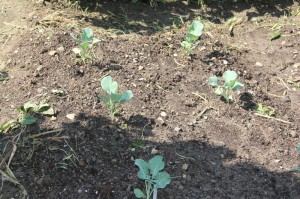 One of the main ways I like to reduce the cost of my grocery bills and still feel my family healthy meals is to grow a garden as well as keep backyard chickens. A large amount of our food this past month has come from our garden, a good thing considering the fact that my husband has been out of work for the past 2 months. In addition to feeding our family both of our freezers are full, one freezer has chicken in it the other has garden produce. Our pantry is close to full with canned goods as well, assuring that we will have food for months to come.
One of the main ways I like to reduce the cost of my grocery bills and still feel my family healthy meals is to grow a garden as well as keep backyard chickens. A large amount of our food this past month has come from our garden, a good thing considering the fact that my husband has been out of work for the past 2 months. In addition to feeding our family both of our freezers are full, one freezer has chicken in it the other has garden produce. Our pantry is close to full with canned goods as well, assuring that we will have food for months to come.
But I am not going to stop there, this year I am motivated to grow a fall garden, while my main motives for doing a fall garden is to continue having fresh produce throughout the fall I also plan to freeze and can more food throughout the fall and early winter season adding even more to the stores we already have.
A fall garden can offer fresh vegetables at a time when they may be considered to be out of season, and the prices begin to rise. There are a number of vegetables that can be harvest through the late fall and even into winter depending on your climate. If you plant early enough you may be able to get a second harvest of zucchini, beans and cucumbers for instance, but the plants that will perform best are a number of root crops and leaf crops.
[one_half]
[custom_list type=”dot”]
Root Crops
Beets
Carrots
Parsnip
Rutabaga
Globe Onions
Leeks
Turnips
Kohrabi
Radishes
[/custom_list]
[/one_half]
[one_half_last]
Leaf Crops
Brussel Sprouts
Cabbages
Cauliflower
Fava Bean
Collards
Swiss Chard
Kale
Broccoli
Lettuce
Spinach
[/one_half_last]
You will need to check with your local extension area to see which crops will grow in your climate as well as the best time to plant them.
Caring for Fall Crops
Sometimes fall crops will need a bit of extra care, you may want to cover them in colder climates, to keep the frost off of them, Cold frames and Cloches are easy to make from materials you can get at your local department or hardware store, and can extend harvests well into the winter depending on your climate.
Mulch is essential for your fall garden, it will help to protect crops from the short cold spells that can occur in the fall and will keep down weeds. I use straw as it is a great insulator but can also protect plants against frosts.
You still need to check your fall crops for moisture, if you have not been getting rain on a regular basis, they can still dry out, and if your crops are mulched you may not be aware of it. When it is cooler outside it can be easy to forget about watering, but plants in dry soil will not thrive in the fall and winter conditions.
Take a Big Bite out of your Food Budget
A successful fall crop can take a big bite out of your food bills in the fall, letting you use the extra money to stockpile other food or the ability to put the money back into debt reduction efforts. In our case it allows us to keep eating good in lean times where there is not enough food money to make it through the month.
With a bit of luck and nice fall you may be fortunate enough to have enough to freeze or can, for some who have been hit with hot weather and drought and low yields this year it could bolster disappointing harvests and give you enough food to make it through the winter. That is what I hope for our fall harvest and the few dollars I invested in seeds is well worth the gamble.





very interesting blog